There are many reasons to love content marketing. There’s the audience engagement and sharing potential. There are the SEO benefits, and the reduced marketing costs.
And then there is the work.
Despite all the benefits of content marketing, there’s no denying it’s a lot of work. Creating content takes time and requires a well-thought out strategy behind it to work. Part of that strategy is figuring out which content vehicles — or formats — are most effective.
Let’s Define “Effective”
Before we leap into which content marketing formats work best, we really should define “effective.”
Effective at what? Lead generation? Customer acquisition? Social shares? The Content Marketing Institute and Marketing Profs wanted to know how marketers were defining effective (i.e. which metrics marketers were tracking) and so they asked them — both B2B and B2C marketers.
Here’s what those marketers said:
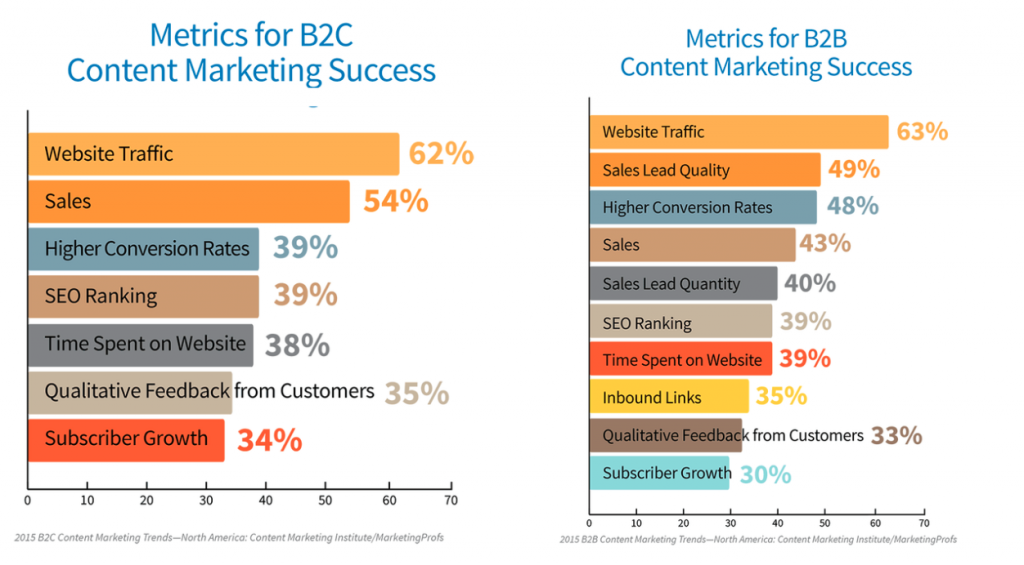
Those are the most commonly tracked metrics. Here’s what fewer than 30% of those marketers said they measure:
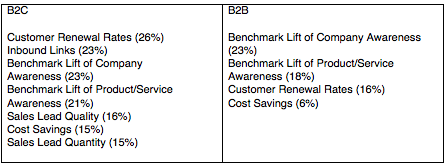
Generally, the stats between the two groups aren’t very different. Here are the percentage differences when the gap is more than 10%:
Sales lead quality 24% difference, B2B is higher Sales 11%, B2C is higher Inbound links 12%, B2B is higherThat’s a fairly predictable difference between B2C and B2B marketers. Sales lead quality, in particular, is mostly the domain of B2B.
Let’s look at another survey that asked a very similar question — Curata’s 2014 Content Marketing Tactics Planner. Here’s what they found:
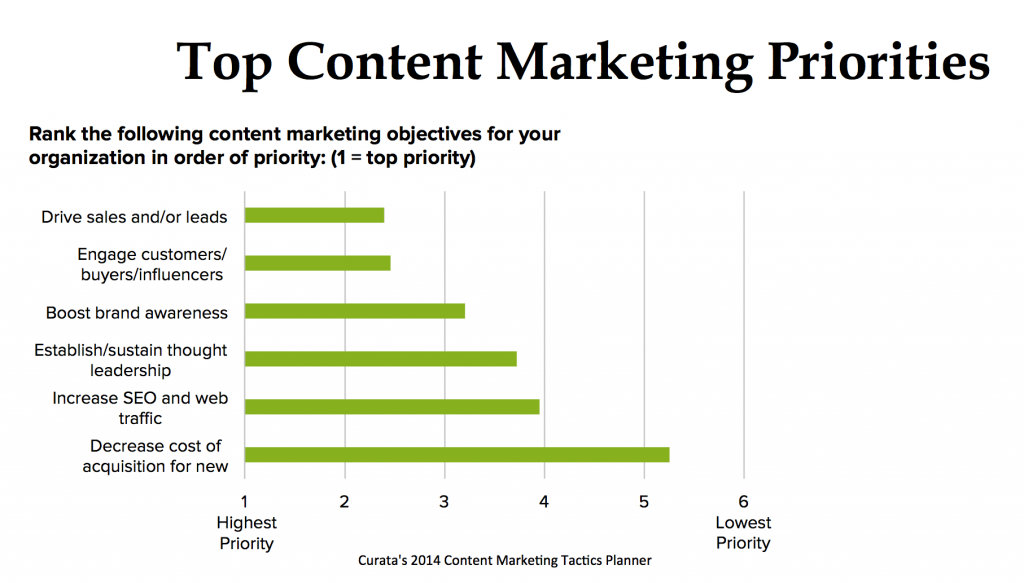
Just one more; here’s IMN Inc’s 2014 Content Marketing Survey Report, where they also asked what marketers were measuring:
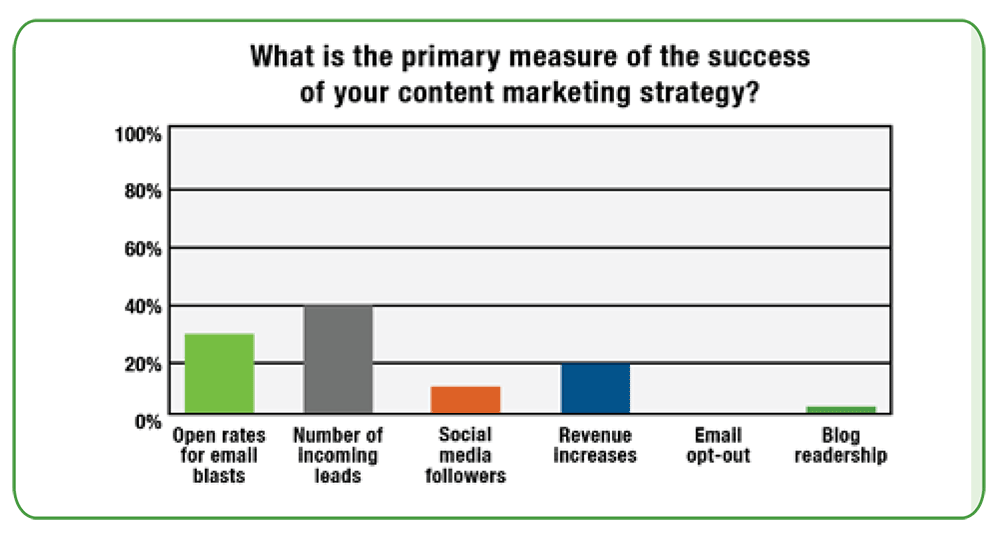
Three out of four of those charts name sales leads as the #1 priority for content marketing. After that it becomes a bit like comparing apples to oranges because the different surveys gave their respondents different ways to answer. However, three things caught my attention:
Website traffic was #1 for both B2C and B2B marketers in the CMI/Marketing Profs survey, but it was the second lowest priority for the Curata respondents. Odd. The CMI/Marketing Profs respondents do agree with the Curata respondents on reducing acquisition costs: Nobody cares. “Decrease cost of acquisition” was the lowest for the Curata people. Only 15% (B2C) and 6% (B2B) of the CMI/Marketing Profs respondents measure “cost savings.” It’s interesting that only 34% (B2C) and 30% (B2B) of CMI/Marketing Profs marketers are trying to grow their subscriber base. That’s a mere one in three. That’s a bit of disconnect, because email newsletters are considered to be the most effective content marketing format for B2C marketers in that same survey. But I’m getting ahead of myself.Which Content Marketing Formats are Effective?
Before we get into what formats are most effective, let’s step back a bit and define another part of this equation: The content marketing formats themselves. This is important because marketers obviously aren’t going to report a content marketing format as effective if they haven’t tried it.
Here’s which content marketing tactics (aka formats) CMI and Marketing Profs found B2C and B2B marketers use:
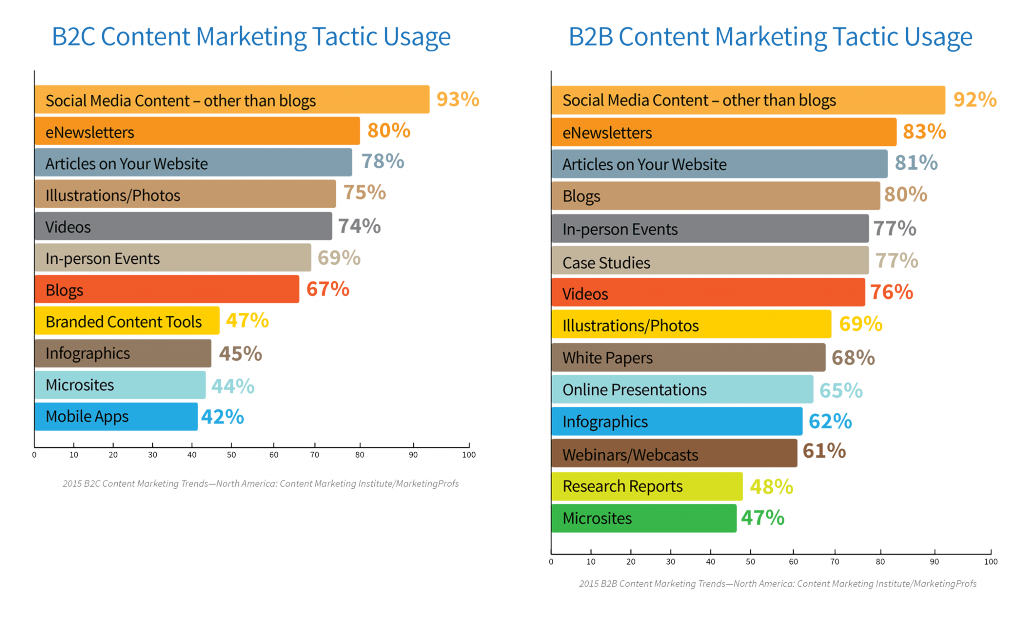
Fewer than 40% of this same group of marketers said they use these tactics:
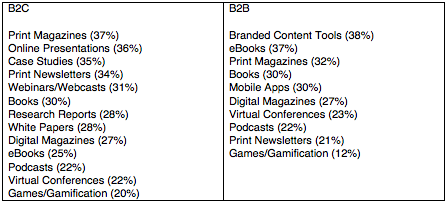
The gaps here are far more pronounced. These are the categories with more than a 10% difference:
Case Studies, 42% difference, B2B higher
White papers, 40% difference, B2B higher
Webinars/webcasts, 30% difference, B2B higher
Online presentations, 29% difference, B2B higher
Research reports, 20% difference, B2B higher
Infographics, 17% difference, B2B higher
Blogs, 13% difference, B2B higher
Print Newsletters, 13% difference, B2C higher
eBooks, 12% difference, B2B higher
Mobile Apps, 12% difference, B2C higher
While those differences are significant, and even stark for a few categories, they’re not too surprising. Some content marketing formats/tactics are just better suited to B2B than to B2C, like white papers. But take note that for a few categories, both groups pulled the same percentage: Podcasts (22%), Digital magazines (27%) and Books (30%). And they were only 2-3 % off for many, if not most of the categories.
So sure, there are significant differences between B2B and B2C content marketing. But there’s also an enormous amount of common ground.
Here’s what Marketing Sherpa marketers said they create for content formats according the to 2013 Marketing Sherpa SEO Marketing Benchmark Survey:
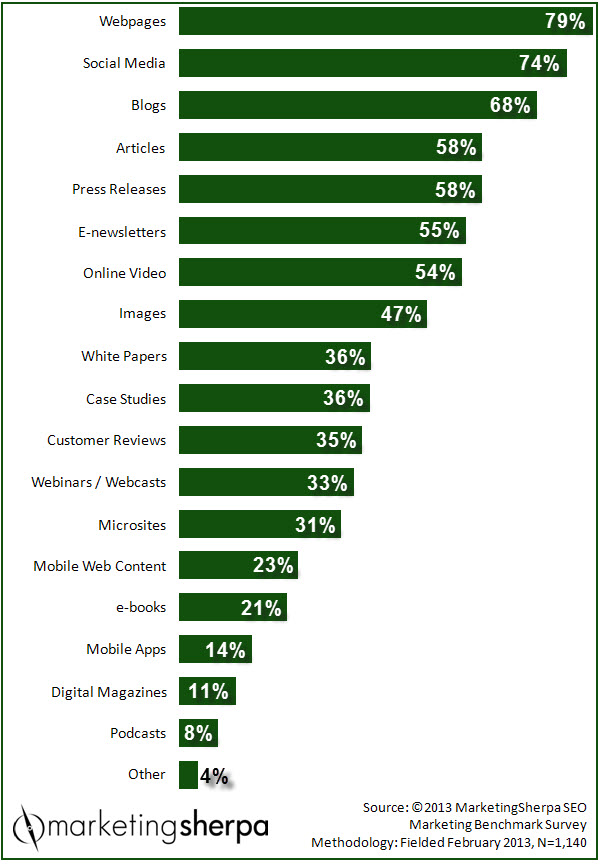
And here’s one more interesting graphic from the Social Media Examiner’s 2014 Social Media Marketing Industry Report. Note that these are the types of content these marketers are using in addition to social media (which includes blogs, of course):
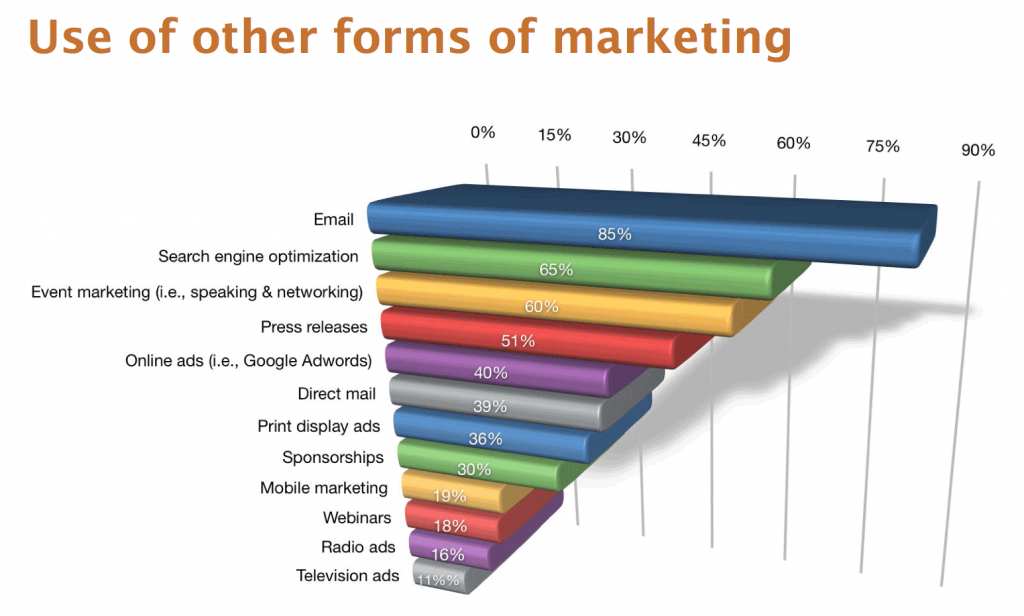
If there’s a commonality across these three charts, it seems like the “big four” of content formats are social, email, websites and blogs. Event marketing makes a prominent appearance in both the CMI/Marketing Profs surveys and in the Social Media Examiner survey. You’ll hear more about event marketing in a moment.
So Which Formats are Most Effective?
Finally, here’s your data candy: the list of which content marketing tactics are most effective, both for B2C and B2B marketers, according the to CMI/Marketing Profs survey:
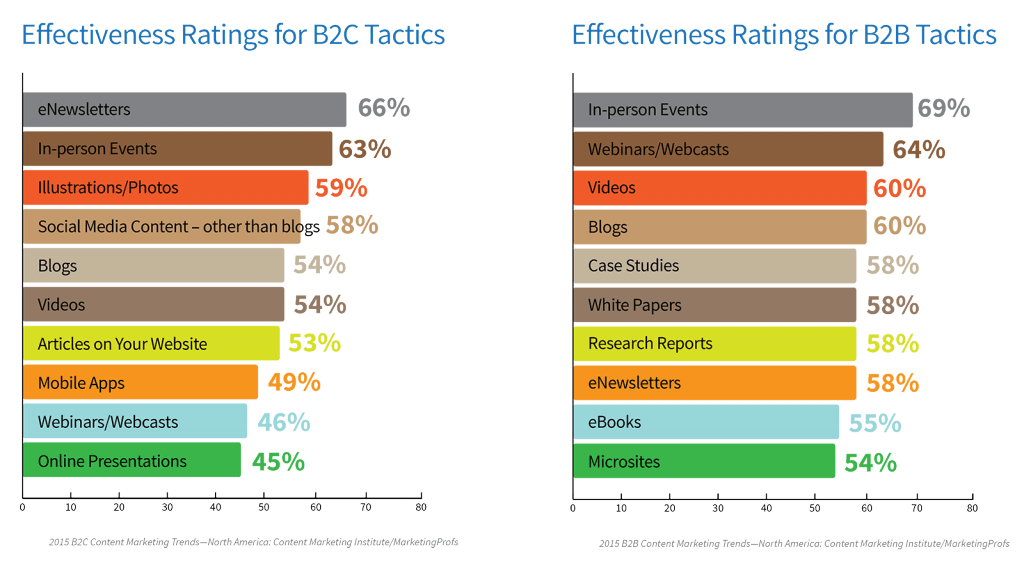
Sadly, the CMI and Marketing Profs report does not give details on which tactics earned less than 45% of marketers’ votes.
Here’s what IMN's survey respondents said:
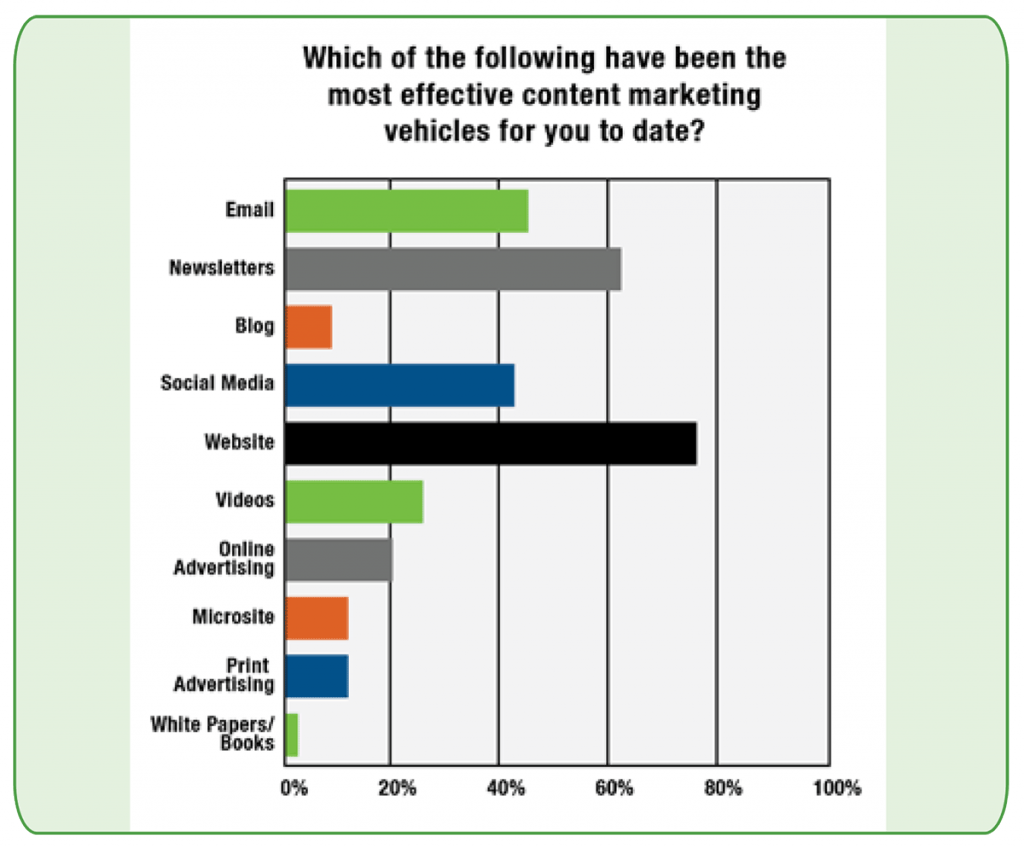
Here’s what European content marketers said earlier this year:
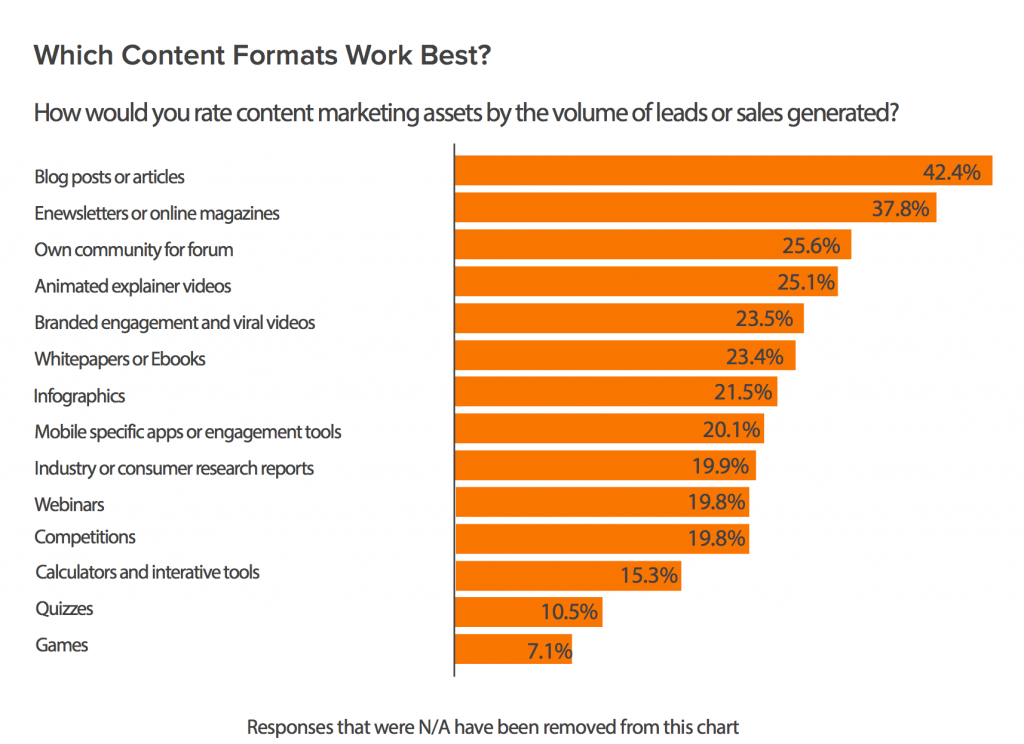
And here’s what Curata’s respondents said earlier this year:
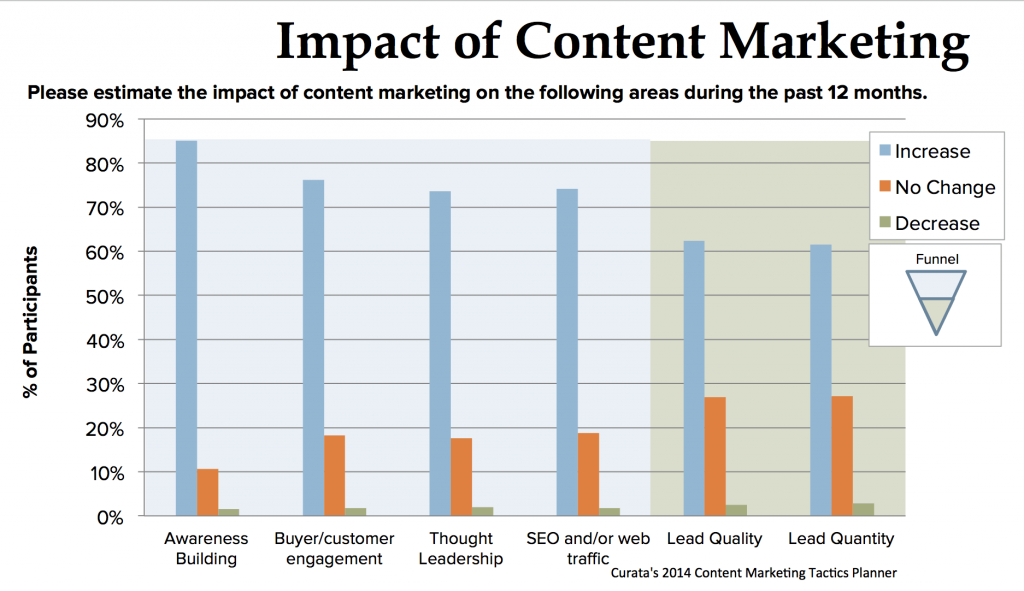
And finally, here’s what Marketing Sherpa survey respondents said in 2013:
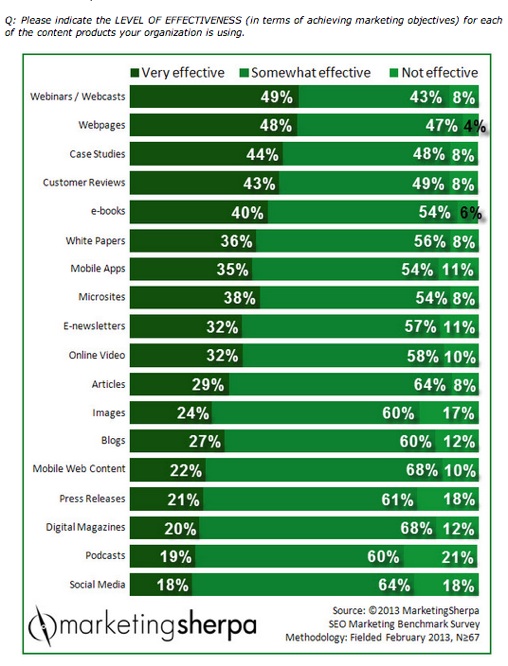
Whew! That’s a whole 'lotta data. Let’s break it down a bit.
Here’s a chart I made, showing the ten most effective content marketing formats according to each of the five surveys that specifically tracked content formats:
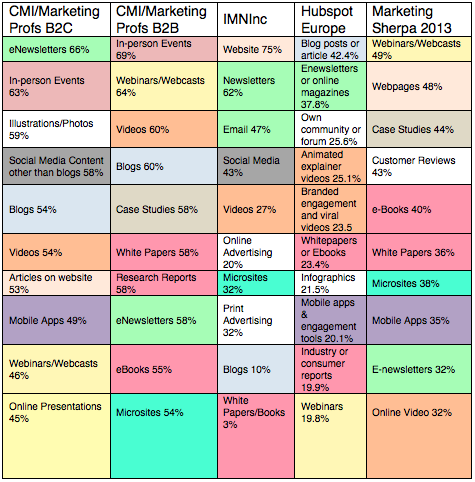
As I’m sure you’ll notice immediately, this is still quite a lot of comparing apples to oranges, but there are some trends here. Email makes the top 10 tactics for every survey, as do videos. White papers/e-books and reports make the list for every survey except the CMI/Marketing Profs B2C. Blogs make four out of five of the top ten tactics for each survey, and for the one they’re not in the top ten (Marketing Sherpa 2013), they came in at #12, just outside the top 10.
The big surprise here is in-person events. Only the CMI/Marketing Profs surveys included those as content types, so they may have broader influence than appears here. Webinars and online presentations also do extremely well.
But Your Own Data is Best
The charts and graphs are fun, and it’s interesting to see patters in the data. But there’s one gigantic problem with everything I’ve shown you. It hasn’t been tested by you. Sure, it has been tested by others, and tested widely, but what really matters is which content formats are effective for your business.
To determine that, you’ll probably need a content audit, even if it’s a micro audit. There are also a few tools that can help. If you’re using CoSchedule, you’ll be able to see which blog posts have gotten the most shares from the dashboard of your account when you log in. And then you can use BuzzSumo to see how your content measures up against your competitors.
Here’s what the social shares count in CoSchedule looks like:
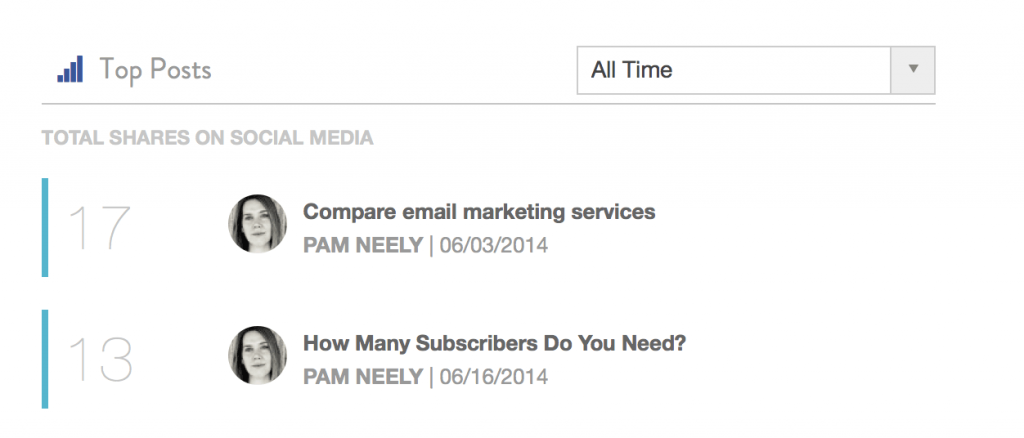
And here’s the view of BuzzSumo, after I’ve queried it to see which pieces of content have done best for one of my competitors:
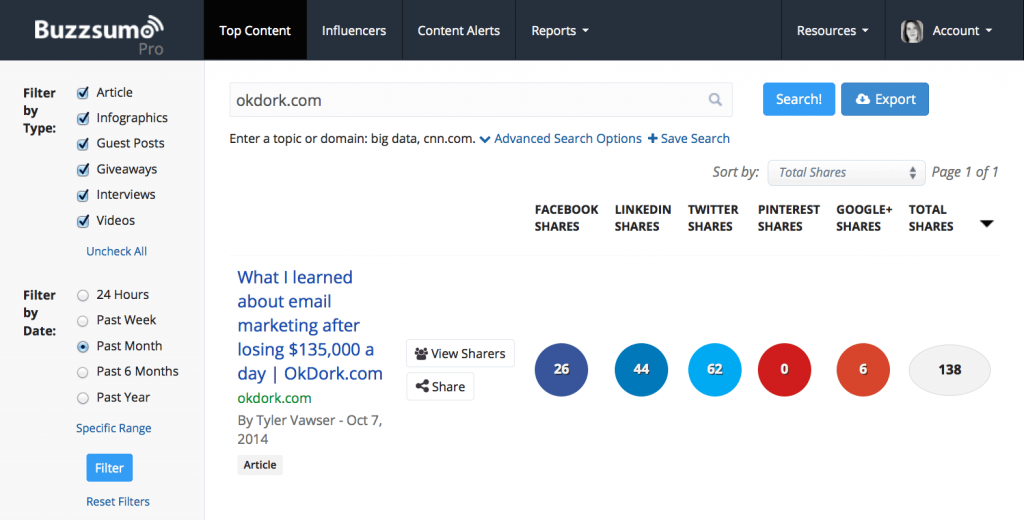
But the real gold lies in your Google Analytics account. Hopefully you’ve already set up Analytics goals to see downloads, email signups and similar conversions. But if you haven’t, check out Garrett Moon’s post, "5 Big Questions About Your Site That Google Analytics Can Answer." It’ll show you everything you need to know to find out which content marketing formats really do work best for you.
Innovative SEO services
SEO is a patience game; no secret there. We`ll work with you to develop a Search strategy focused on producing increased traffic rankings in as early as 3-months.
A proven Allinclusive. SEO services for measuring, executing, and optimizing for Search Engine success. We say what we do and do what we say.
Our company as Semrush Agency Partner has designed a search engine optimization service that is both ethical and result-driven. We use the latest tools, strategies, and trends to help you move up in the search engines for the right keywords to get noticed by the right audience.
Today, you can schedule a Discovery call with us about your company needs.
Source:




![How To Create a Strategic Dashboard in Excel Using Semrush Data [Excel Template Included]](https://allinclusive.agency/uploads/images/how-to-create-a-strategic-dashboard-in-excel-using-semrush-data-excel-template-included.svg)
